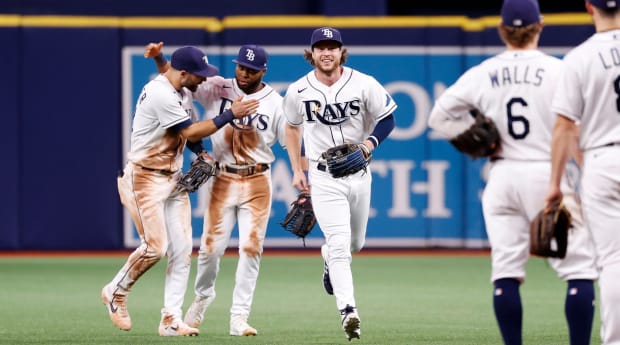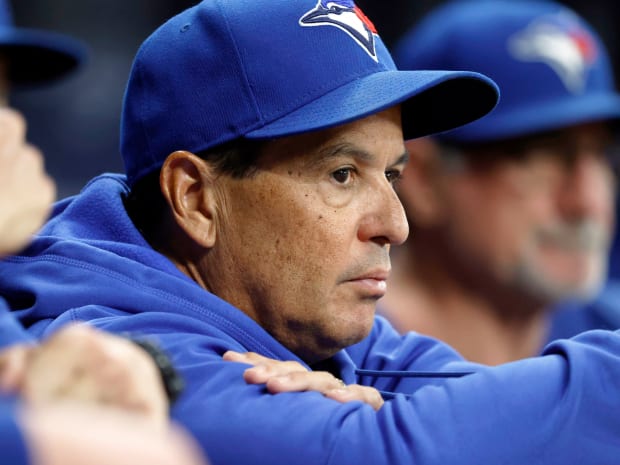Like stealing signs without technology, there's nothing wrong with scooping up another team's note card.
Welcome to The Opener, where every weekday morning you’ll get a fresh, topical column to start your day from one of SI.com’s MLB writers.
A Major League Baseball game can demand a staggering level of preparation. Analysts, coordinators, various members of the coaching staff: All will collaborate to find the weaknesses of their upcoming opponent and how best to attack them. Just about every aspect of the game can be tailored for the specific matchup. This includes the pitching, obviously, but also the signs, the defensive positioning—almost everything.
The result of all this work is an intricate, ambitious game plan, a series of keys designed to unlock a desired outcome. Which the players then carry right onto the field with them.
This is not weird only because we are used to thinking of it as not weird. Generally, in fact, we don’t think of it much at all—it’s completely unremarkable to see a catcher glancing at his wristband between hitters or an outfielder checking an index card to determine just how many steps he should take to his right. But that’s remarkable in and of itself, because we should be more open to the idea that it is, in fact, somewhat weird. A system dependent on bringing paper copies of your game plan out onto the field—the very field where physically interacting with the very opponents you are trying to hide that plan from—is often, you know, part of the job. That's just weird!

Kim Klement/USA TODAY Sports
You probably have an idea of where this is going. On Tuesday, shortly before the scheduled first pitch between the Blue Jays and Rays, news broke of a testy situation that had unfolded in their game Monday. In the sixth inning, Rays outfielder Kevin Kiermaier had slid for a play at the plate, where a note card had popped out of the wristband of Blue Jays catcher Alejandro Kirk. Kiermaier picked up the card and took it back to the dugout with him. It reportedly contained Toronto’s plan for pitching to Tampa Bay, and the Blue Jays, unsurprisingly, were not happy about this.
According to Sportsnet, Toronto sent a bat boy to the Rays’ dugout to ask for the card back, and he was promptly rebuffed. (A scenario that offers its own rich tapestry of questions: Who decided it was worth sending the bat boy over? How did they think the Rays would respond?? Was this a calculated choice—an appeal to emotion with the least intimidating member of the staff as the messenger???) Kiermaier addressed the matter before the game Tuesday: “I picked it up, didn’t know what it was, if it was mine or not,” he said. “They’re all pretty similar, and then as I picked it up, I realized it was that. I never even looked at it, I’ll say that.” If the last line strains credulity—just a bit—the first one should not. Kiermaier, like most outfielders, had his own note card with key information stashed in his pocket, and at a glance, there would have been no way to tell if the card on the ground was his or Kirk’s.
(He went on to add: “It’s September, whatever. I didn’t know what was going on,” which is almost certainly a reference to the fact that it’s the end of the regular season and this is an intradivision game where pitchers already know plenty about these hitters, note card or not, but it’s delightful nonetheless to see it as an all-purpose explanation for any behavior one might be asked to justify this month. It’s September, whatever. Pick up a note card. Let yourself run late. Steal a car. I didn’t know what was going on.)

Kim Klement/USA TODAY Sports
Whatever animosity had been lingering faded during the game Tuesday. After the Blue Jays won, 4–2, to keep their grip on the second wild-card berth, Toronto manager Charlie Montoyo said that Tampa Bay skipper Kevin Cash had apologized to him about the note card, calling it “agua under the bridge.”
For Cash to apologize was all well and good. But it does poke at the question of whether he really had anything to apologize for. In a league not long removed from a massive reckoning over where trickery crosses the line between normal game play and point-blank cheating, it’s unsurprising that an incident like this would pick up traction. But picking up a note card from the field is not like stealing signs—which, it’s worth stressing, is normal game play, so long as it’s not technologically aided—because it’s not stealing anything. It’s picking up a note card from the field! It’s obviously unpleasant for the Blue Jays. So is leaving a $20 bill out on the sidewalk. But there’s nothing you can do about it once it’s left your pocket.
It’s funny, and it’s a bit slippery, and it certainly has the potential to get weird. A club’s game-plan preparation can feel almost sacred. Once it’s put in writing? That opens up all sorts of honest bad luck. It goes wherever the note card goes, whoever picks it up, not unlike getting a sign with nothing but your eyes and sharing it with nothing but your hands. It’s normal game play—not point-blank cheating—as clear as if it were written down.
More MLB Coverage:
• Why Is Joey Votto Here?
• Will This Mariners Rebuild Be Any Different?
• Blue Jays' Bashing Offense Is the Answer to MLB's Woes
• The Ohtani Rules